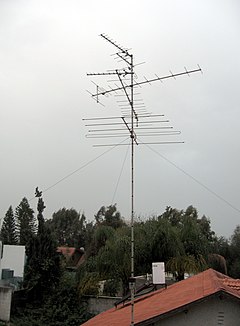The Canadian Broadcasting Corporation, branded as CBC/Radio-Canada, is a Canadian federal Crown corporation that serves as the national public broadcaster for both radio and television. The English- and French-language service units of the corporation are commonly known as CBC and Radio-Canada respectively, and both short-form names are also commonly used in the applicable language to refer to the corporation as a whole.

Very high frequency (VHF) is the ITU designation for the range of radio frequency electromagnetic waves from 30 to 300 megahertz (MHz), with corresponding wavelengths of ten meters to one meter.
Frequencies immediately below VHF are denoted high frequency (HF), and the next higher frequencies are known as ultra high frequency (UHF).

Broadcasting is the distribution of audio or video content to a dispersed audience via any electronic mass communications medium, but typically one using the electromagnetic spectrum, in a one-to-many model. Broadcasting began with AM radio, which came into popular use around 1920 with the spread of vacuum tube radio transmitters and receivers. Before this, all forms of electronic communication were one-to-one, with the message intended for a single recipient. The term broadcasting evolved from its use as the agricultural method of sowing seeds in a field by casting them broadly about. It was later adopted for describing the widespread distribution of information by printed materials or by telegraph. Examples applying it to "one-to-many" radio transmissions of an individual station to multiple listeners appeared as early as 1898.
Public broadcasting includes radio, television and other electronic media outlets whose primary mission is public service. In much of the world, funding comes from the government, especially via annual fees charged on receivers. In the United States, public broadcasters may receive some funding from both federal and state sources, but generally most financial support comes from underwriting by foundations and businesses ranging from small shops to corporations, along with audience contributions via pledge drives. The great majority are operated as private not-for-profit corporations.

9

A news magazine is a typed, printed, and published piece of paper, magazine or a radio or television program, usually published weekly, consisting of articles about current events. News magazines generally discuss stories, in greater depth than do newspapers or newscasts, and aim to give the consumer an understanding of the important events beyond the basic facts.

The Islamic Republic of Iranian Broadcasting (IRIB), formerly called National Iranian Radio and Television until the Iranian revolution of 1979, is an Iranian media corporation which holds a monopoly of domestic radio and television services in Iran, and is also among the largest media organizations in the Asian and Pacific regions, and a regular member of Asia-Pacific Broadcasting Union. IRIB is independent of the Iranian government, but its head is appointed directly by the Supreme Leader, Ayatollah Ali Khamenei.

The Swiss Broadcasting Corporation is the Swiss public broadcasting association, founded in 1931. Headquartered in Bern, the Swiss Broadcasting Corporation is a non-profit organisation, funded mainly through radio and television licence fees (70%) and making the remaining income from advertising and sponsorship.
Mediacorp Pte. Ltd. is a media conglomerate based in Singapore. It holds interests in radio, television, digital, print publishing and filmmaking. It runs 7 television channels and 11 radio stations, making it the largest media business in Singapore; it holds a monopoly on free-to-air television in Singapore. It is owned by Temasek Holdings, a state-owned investment arm.

There are several different types of media in the United Kingdom: television, radio, newspapers, magazines and websites. The country also has a strong music industry. The United Kingdom has a diverse range of providers, the most prominent being the publicly-owned public service broadcaster, the British Broadcasting Corporation (BBC). The BBC's largest competitors are ITV plc, which operates 13 of the 15 regional television broadcasters that make up the ITV Network, and American global media conglomerate Comcast, which owns the broadcaster Sky Ltd. Regional media is covered by local radio, television and print newspapers. Trinity Mirror operates 240 local and regional newspapers, as well as national newspapers such as the Daily Mirror and the Sunday Mirror.
The National Radio and Television Administration (NRTA), formerly the State Administration of Radio, Film, and Television and the State Administration of Press, Publication, Radio, Film and Television, is a ministry-level executive agency directly under the State Council of the People's Republic of China. Its main task is the administration and supervision of state-owned enterprises engaged in the television and radio industries.

The Three Angels Broadcasting Network (3ABN), is an American nonprofit Seventh-day Adventist television and radio network broadcasting Christian and health-oriented programming, based in West Frankfort, Illinois.
In broadcasting, a channel or frequency channel is a designated radio frequency, assigned by a competent frequency assignment authority for the operation of a particular radio station, television station or television channel.
Walt Disney Television is a division of Disney Media Networks that oversees television assets owned and operated by The Walt Disney Company. It was formerly called Disney–ABC Television Group, until Disney's acquisition of 21st Century Fox assets on March 20, 2019. Assets in the group include the ABC network; cable networks: Freeform, Disney Channels, FX and National Geographic channels; Disney Television Studios: ABC Studios, 20th Century Fox Television and Fox 21 Television Studios; ABC News; and ABC Owned Television Stations. The division also manages Disney's 50% equity stake in A&E Networks. Along with ESPN, Walt Disney Television are the two primary divisions of Disney Media Networks. The Walt Disney Television chairman and president is Peter Rice, who also serves as co-chairman of Disney Media Networks.
Cubavision International is an internationally broadcast Spanish-language channel run by Cuba's national broadcaster, Cuban Institute of Radio and Television. There is also a national channel called Cubavisión with different contents and an own logo.

The All-Russia State Television and Radio Broadcasting Company, in short VGTRK which operates a large number of television and radio channels in 53 of Russia's languages. The company was founded in 1990 and is based in Moscow.
KBS World is Korean Broadcasting System's international broadcasting service. It consists of KBS World Radio and the KBS World television channel.
The television industry in China includes high-tech program production, transmission and coverage. China Central Television is China's largest and most powerful national television station. By 1987, two-thirds of people in China had access to television, while today, over 3,000 channels are available in the country.
The British Broadcasting Corporation (BBC) is a British public service broadcaster. Its headquarters are at Broadcasting House in Westminster, London, and it is the world's oldest national broadcasting organisation and the largest broadcaster in the world by number of employees. It employs over 20,950 staff in total, 16,672 of whom are in public sector broadcasting. The total number of staff is 35,402 when part-time, flexible, and fixed-contract staff are included.

China Media Group and IPA pronunciation, also known as Voice of China, is the predominant state media company by means radio and television broadcasting in the People's Republic of China. It was founded on 21 March 2018, and it's the combination of China Central Television, China National Radio, and China Radio International.











